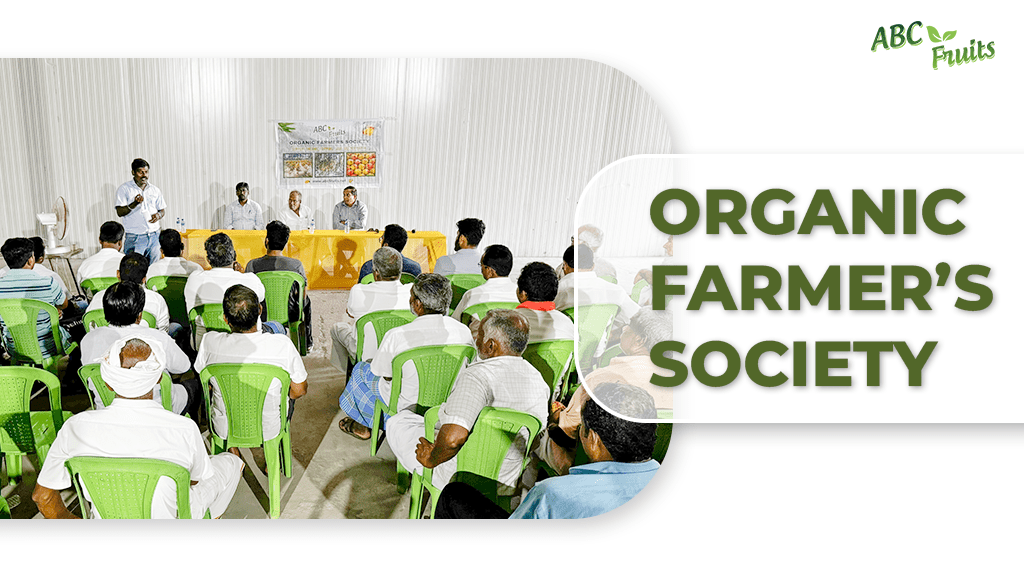
Organic Mango Farming with ABC Fruits Organic Farmers Society
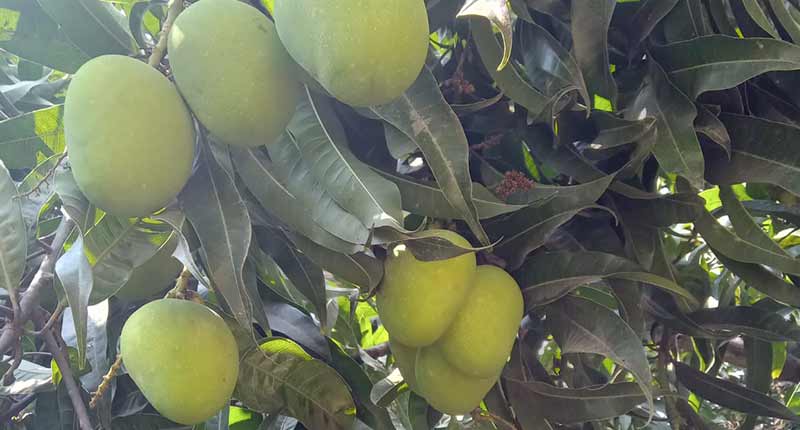
SCENTIFIC NAME : Mangifera indica
FAMILY: Anacardiaceae
In an era where sustainable agriculture is no longer a choice but a necessity, ABC Fruits Organic Farmers Society has taken the lead in empowering mango farmers across Tamil Nadu with eco-friendly, organic farming practices. By harmonizing age-old organic wisdom with modern agricultural science, the society is not just growing mangoes—it’s cultivating a healthier ecosystem and more resilient farming communities.
Why Mangoes? Why Organic?
Mangoes, Alphonso Mango often called the “King of Fruits”, are not only rich in flavor and nutrition but also an integral part of India’s horticultural landscape. However, with increasing chemical use, soil degradation, and climate change, traditional mango farming faces many challenges. The shift toward organic mango farming is not just about consumer health—it’s about environmental stewardship and long-term farm sustainability.
Supporting Organic Mango Farmers: The Work of ABC Fruits Organic Farmers Society
In the farming regions of Krishnagiri and Tirupattur in Tamil Nadu, the ABC Fruits Organic Farmers Society has been supporting farmers in growing mangoes using natural and organic methods. Since 2020, the society has partnered with over 100 farmers to help them improve both the quality and yield of their mango crops through organic farming practices.
Helping Farmers Grow Better Mangoes
The society provides training and support to farmers, teaching them how to grow mangoes without using harmful chemicals. Their staff visits farms regularly to give advice and help farmers follow the best practices. Because of this support, many farmers have been able to grow more mangoes in a healthy and natural way.
The society encourages the use of natural pest control, like neem-based solutions, and teaches farmers to follow Good Agricultural Practices (GAPs). These steps help keep the soil healthy and produce high-quality fruit that is safe to eat.
Promoting Organic Farming
While mangoes are the main focus, the society also helps farmers with other parts of organic farming. They guide farmers on how to use compost, avoid banned chemicals, and take care of water and soil. This helps farmers protect the environment and grow better crops for the future.
The society also helps with transporting mangoes, making sure farmers get fair prices and quick payments — without any middlemen or extra charges. This is especially useful for exporters and importers looking to buy fresh, chemical-free mangoes directly from farmers.
A Better Future with Organic Farming
ABC Fruits Organic Farmers Society is not just about farming — it’s about building a better future for farmers and the environment. By combining traditional farming knowledge with modern organic methods, the society helps farmers earn more while keeping their farms healthy for the long term.
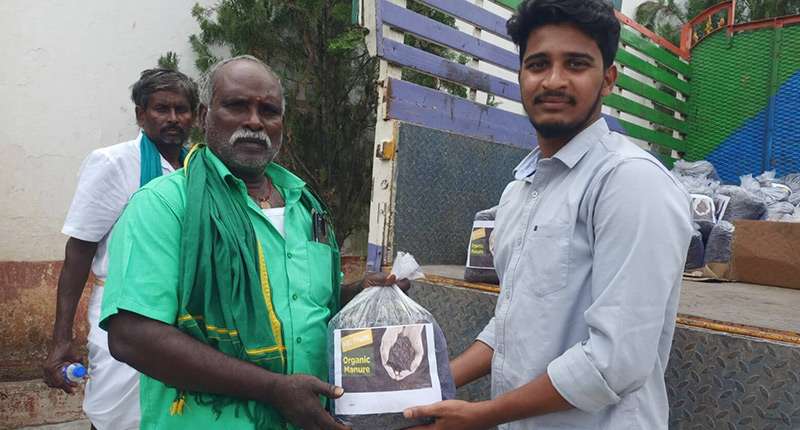
Mango Varieties Suited for Tamil Nadu
ABC Fruits focuses on regionally adaptable mango cultivars to ensure high yields and robust disease resistance. These include:
- Alphonso Mango
- Totapuri Mango
- Neelam Mango
- Rumani Mango
- Sindhura Mango
- Banganapalli Mango
- Mulgoa Mango
These varieties are selected for their climate compatibility, taste profiles, and market demand.
Ideal Growing Conditions
To optimize mango growth organically, ABC Fruits emphasizes:
Soil Type: Red loamy soils with good drainage.
pH Range: Between 6.5 to 8.5.
Planting Season: July to December.
Pit/Field Preparation: Dig pits of 1 m x 1 m x 1 m. Fill in with topsoil mixed with 10 kg of FYM and 100 g per pit
Irrigation: Regular watering is recommended till establishment. Under conventional irrigation systems, weekly irrigation is essential. However, under drip-irrigation the requirement is restricted to one-third of the water required for conventional method.
Efficient Water Management
Water conservation is vital in organic farming. ABC Fruits promotes:
- Weekly irrigation under conventional systems.
- Micro-irrigation, which uses only one-third of the conventional water requirement—promoting sustainability.
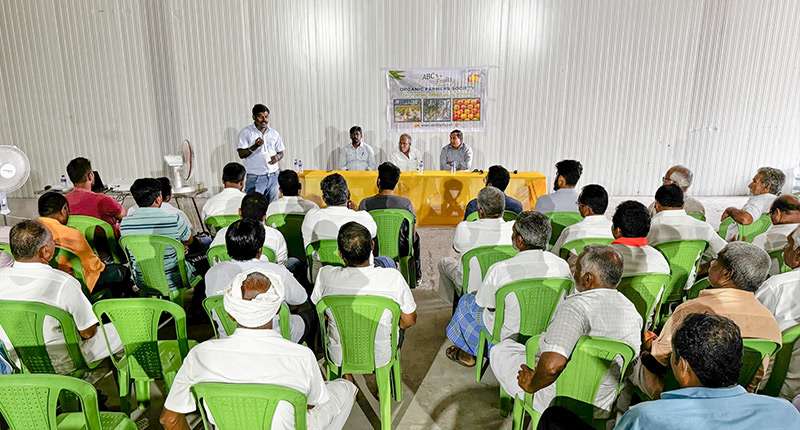
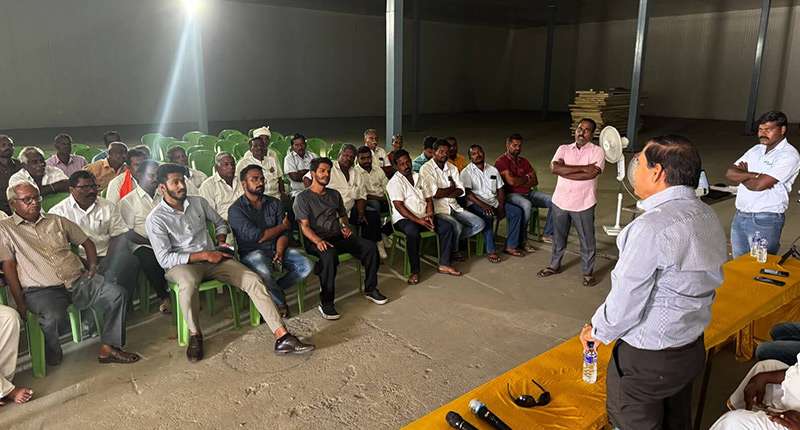
Application of Manures and Organic Fertilizers (per tree)
Organic manures and fertilizers should be applied during the post-monsoon period, preferably between September and October, to enhance nutrient uptake and tree vigor.
The recommended application zone is within a radius of 45 to 90 cm from the trunk, extending up to the peripheral leaf drip line. Nutrients should be thoroughly incorporated into the soil for optimal absorption and effectiveness.
Panchagavya: A Natural Growth Enhancer for Organic Farming
Panchagavya is a traditional, organic formulation widely used in sustainable agriculture to promote plant growth, improve immunity, and enhance crop yield and quality. The word “Panchagavya” is derived from Sanskrit, meaning “five products of the cow.” It is a mixture of nine natural ingredients, primarily sourced from indigenous cows, and has proven benefits in organic farming.
Ingredients of Panchagavya
The preparation consists of the following components:
Cow dung – 7 kg
Cow ghee (clarified butter) – 1 kg
Cow urine – 10 liters
Water – 10 liters
Cow milk – 3 liters
Cow curd – 2 liters
Tender coconut water – 3 liters
Jaggery (unrefined cane sugar) – 3 kg
Well-ripened poovan bananas – 12 nos.
Step-by-Step Preparation Process
- Initial Fermentation (Day 1–3):
- Mix 7 kg of fresh cow dung with 1 kg of cow ghee in a clean container.
- Stir the mixture thoroughly every morning and evening for three days.
- Secondary Fermentation (Day 4–18):
- On the fourth day, add 10 liters of cow urine and 10 liters of clean water to the mixture.
- Continue stirring the contents twice daily (morning and evening) for the next 15 days.
- Final Mixing (Day 19–30):
- Add the remaining ingredients:
- 3 liters cow milk
- 2 liters cow curd
- 3 liters tender coconut water
- 3 kg jaggery
- 12 well-ripened poovan bananas (mashed)
- Initial Fermentation (Day 1–3):
- Mix thoroughly and allow the entire blend to ferment for an additional 12 days, stirring it twice daily.
Put all the ingredients into a wide-mouthed container—you can use a mud pot, concrete tank, or plastic can. Add the ingredients in the same order as mentioned.
Keep the container in a shaded place and make sure it’s not sealed. Stir the mixture twice every day—once in the morning and once in the evening.
The Panchagavya will be ready in 30 days.
Important Tips:
- Do not use buffalo products—only use cow products, especially from local (native) cow breeds, which are considered more effective.
- Cover the container with a mosquito net or wire mesh to keep away houseflies and prevent maggots from forming.
- If sugarcane juice is not available, you can replace it with 500 grams of jaggery mixed in 3 liters of water.
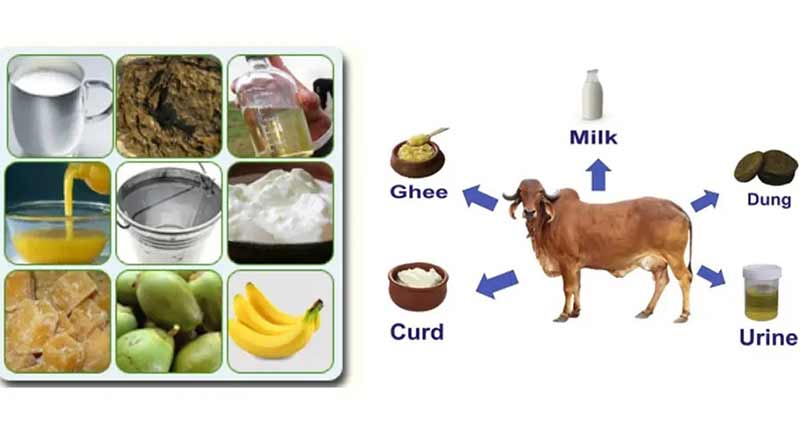
Beneficial effects of Panchagavya in Organic Farming
- Induces dense flowering with more female flowers
- Irregular or alternate bearing habit is not experienced and continues to fruit regularly
- Enhances keeping quality by 12 days in room temperature
- Flavour and aroma are extraordinary
Organic Pest and Disease Management in Mango Farming
Maintaining plant health without chemical pesticides is essential for organic farming. At ABC Fruits Organic Farmers Society, farmers use time-tested natural solutions to manage common pests and diseases effectively.
Common Mango Pests
Thrips
Hoppers
Webbers
Mealy Bugs
Aphids
Fruit fly
Natural Pest Control Methods
Neem-Based Insecticide
Neem leaf extract acts as a natural insecticide by repelling, deterring feeding, and disrupting the growth and reproduction of various insects and nematodes. The active compound, azadirachtin, is a potent growth regulator and feeding deterrent. Neem extract can be used as a pesticide against a wide range of pests, including moths, aphids, leaf and plant hoppers, and nematodes.
Neem Kernel extracts 500 to 2000 ml per tank (10 litres capacity)
Preparation (for 1 acre):
- 3-5 kgs of neem kernel is required for an acre. Remove the outer seed coat and use only the kernel.
- If the seeds are fresh, 3 kgs of kernel is sufficient. If the seeds are old 5 kgs are required.
- Pound the kernel gently and tie it loosely with a cotton cloth. Soak this overnight in a vessel containing 10 litres of water. After this, it is filtered. On filtering, 6-7 litres of extract can be obtained.
- 500-1000 ml of this extract should be diluted with 9 ½ or 9 litres of water. Before spraying khadi soap solution @ 10 ml/litre should be added to help the extract stick well to the leaf surface.
- This concentration of the extract can be increased or decreased depending on the intensity of pest attack.
Garlic, Chilli, Ginger extract 500 to 1000 ml per tank (10 litres capacity)
This is a mixture of three plant extracts. 18 grammes of garlic is taken, the outer skin is removed and made into paste. A paste of 9 grammes of green chilli and 9 grammes of ginger is made. All the three pastes are dissolved in 1 litre of water. This mixture is stirred well and filtered before spraying. 500 ml of this extract is made with 100 ml of soap solution and 9.4 litres of water and sprayed on the top.
Fruit Fly Management
ABC Fruits Organic Farmers Society supplies organic fruit fly traps to farmers. These traps help reduce fruit fly populations without the use of chemical pesticides, ensuring fruit quality and safety.
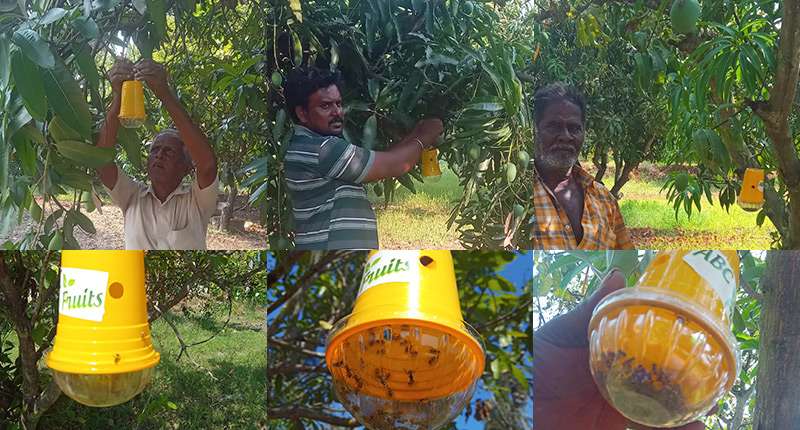
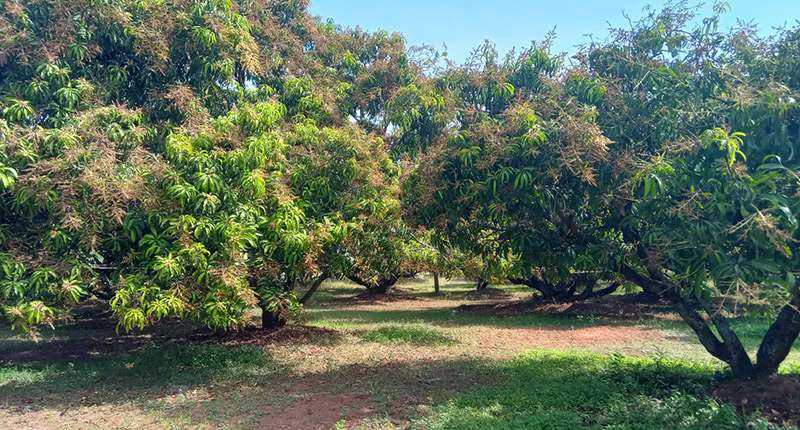
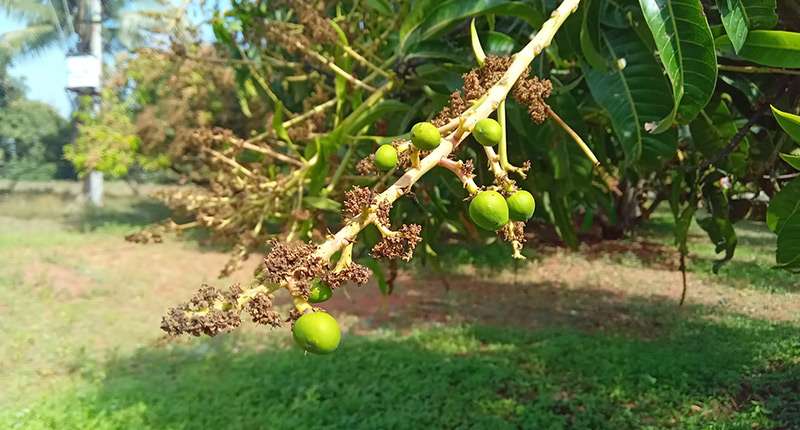
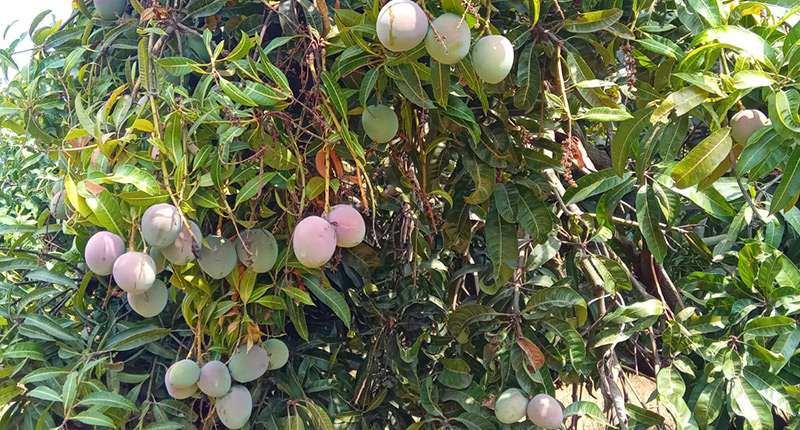
Strategies for Organic Mango Disease Control
Pruning and Sanitation:
Removing infected plant parts like leaves, flowers, and fruits, and pruning to improve air circulation, can help reduce disease spread.
Cultural Practices:
Good soil management, including using vermicompost, and balanced nutrition can strengthen trees and make them more resistant to disease.
Biological Control:
Encouraging beneficial insects and natural predators can help control pest populations, which can contribute to disease spread.
Natural Products:
Foliar sprays based on neem oil, sulfur, carbonic acid, koanin, and ascorbic acid can help prevent and control certain diseases, like powdery mildew.
Harvest Season and Yield
The mango harvest season typically extends from April to July, depending on the variety and regional climatic conditions.
Expected Yield
Mango yield varies based on the cultivar and planting density:
- 8 to 10 tonnes per hectare for trees up to 15 years of age
- 15 to 20 tonnes per hectare for trees aged between 15 and 20 year
Proper orchard management and organic practices can further enhance both yield and fruit quality
ABC Fruits Organic Mango Product Offerings
ABC Fruits offers a wide range of Organic mango products, including:
Organic Puree:
Organic Alphonso Mango Puree (Min 16° Brix)
Organic Totapuri Mango Puree (Min 14° Brix)
Organic Concentrate:
Organic Totapuri Mango Concentrate (Min 28° Brix)
Conclusion: Nurturing Nature for a Sustainable Future
ABC Fruits Organic Farmers Society is setting a benchmark in sustainable mango cultivation by empowering farmers with time-tested organic practices, scientific guidance, and community-driven support. From preparing Panchagavya to implementing natural pest control and disease management strategies, every step is rooted in environmental care and long-term farm productivity.
As global demand for clean, chemical-free produce continues to rise, organic mango farming offers a powerful opportunity—not just to meet market needs, but to regenerate soil health, protect biodiversity, and ensure a better livelihood for farmers. With continued innovation, education, and collaboration, ABC Fruits is leading the way in transforming India’s mango farming landscape—naturally and responsibly.
